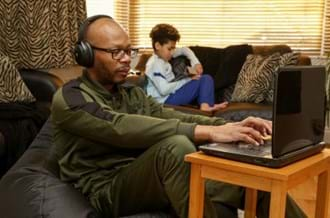We can fight the adolescent mental health crisis by teaching resilience skills
We can fight the adolescent mental health crisis by teaching resilience skills
Dr Anne-Laura van Harmelen and Professor Tamsin Ford from the University of Cambridge's Department of Psychiatry write about how teaching coping skills and having support from friends, family and (even) pets can support teenager's mental health. Professor Tamsin Ford is Research Chair of children’s mental health charity Place2Be.
There is a global crisis in the mental health of young people. In the UK, as many as one in eight young people suffer from a diagnosable mental illness – that’s around three to four children in every class.
Over the past 18 years, the number of young people suffering in terms of their mental health has grown, with worrying increases in self-harming, depression and anxiety among teenage girls.
With mental health services underfunded and overstretched, it is critical that we better understand how we can build the strong emotional foundations that all young people need to thrive and be mentally healthy.
Boosting resilience
Resilience refers to our ability to remain mentally healthy, or to quickly regain mental health, in the face of stress. While resilience varies between people – one person’s final straw would not necessarily upset another – the stress experienced is still valid.
There is no such thing as a ‘resilience gene’ or a ‘resilient personality’, and resilience can vary over time within the same person.
Our societal values, relationships with people, and self-esteem all play an important role in aiding our resilience. These factors are inextricably intertwined.
A young person’s ability to respond to stress, therefore, relies on a number factors – this means that there are skills that can be learned that can help young people to cope better with stress. There are also things that communities (including schools and workplaces) can do to support young people to cope better with the inevitable challenges that life will throw at them.
One of the strongest building blocks that can help to boost resilience in teenagers is social support. This can come from family, friends, neighbours and even pets.
Having positive interactions with people you’re close to can help you to release stress. These positive experiences shape positive memories of these interactions, which is very important as our memory guides our behaviour. For example, negative memories may lead us to avoid certain people, events or behaviours (i.e. not cycling past that group of young people that bullied me in the past). While positive memories may help us to seek out positive individuals, or situations (i.e. approaching that kind neighbour when I fell off my bike).
Our research has shown that recalling such positive memories improves resilience in vulnerable young people which helps them to better cope with the stress their experiencing.
Friends may therefore possibly help young people cope with stress through improving the number of positive memories to recall in the face of stress (i.e. that time where I went ice skating with my best friend).
We can support young people’s ability to cope with the inevitable stresses of life through providing them with the tools and resources that aid resilience. And this is where schools play a critical role. Giving young people the skills they need to facilitate good personal interactions will support resilience on an individual level. While buddy systems, peer support networks, and robust school-wide processes (that work to reduce conflict and prevent bullying) can help to build a supportive school community.
Promoting an understanding of mental health is as important as teaching about physical health. Schools can help young people to know how to regulate their emotions, solve problems, and be aware of any situations that might trigger them, and help them plan some things that might help them cope better when life gets tough. This may include daily journaling to help improve the recall of positive memories.
Journaling helps people to focus on what is going well and distracts them from harmful rumination about what is not so great. Making sure that you keep doing things you enjoy, such as sports, music or drama, and fighting the impulse to hide away or focus only the sources of stress are equally important. People often need prompting to do this.
While there are many external factors that can affect poor mental health, such as deprivation or adverse community events, schools that promote strong social relationships and teach practical coping skills are likely to have more resilient pupils, who are able to learn more effectively.
News & blogs

Place2Be online parenting course now available to organisations
Place2Be's online parenting course helps working parents and carers feel better equipped to manage their parenting journey.
Read more
Three charities launch wellbeing video for young carers
Three charities have joined forces to launch a new video aimed at fostering the wellbeing and creativity of young carers.
Read more
“Know Yourself, Grow Yourself”: A look back at Children’s Mental Health Week 2025
During Children’s Mental Health Week 2025, we encouraged people to embrace self-awareness and explore what it means to them.
Read more



